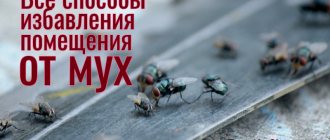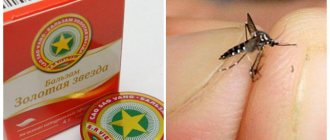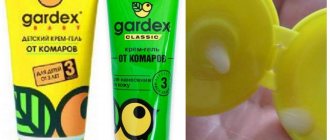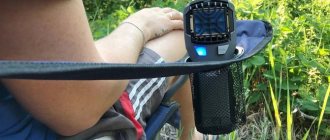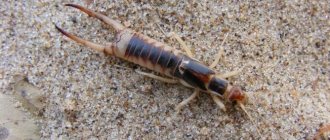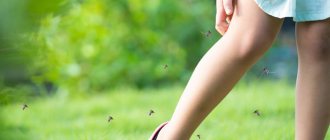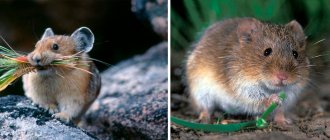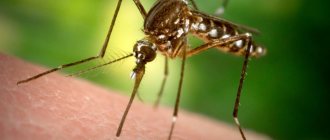Summer is a time of relaxation and fun, sunshine, fragrant barbecue and long walks in nature. Often a pleasant pastime is overshadowed by blood-sucking insects such as mosquitoes. Their annoying squeaks and painful bites, accompanied by unbearable itching and swelling, deprive them of rest and sleep. There are many different mosquito repellents designed to combat blood-sucking pests. But sometimes it happens that there is no anti-mosquito aerosol or cream at hand. Don’t despair; you can make your own mosquito repellent. Recipes for mosquito repellents made at home are very diverse.
Vodka spray
Aerosols and sprays with repellent properties are recognized as the most convenient to use. You can make a similar anti-mosquito liquid yourself by mixing vodka (100 ml) with essential oil (5-10 ml) of eucalyptus, lavender, cloves or basil. The thoroughly mixed mixture is poured into a spray bottle and sprayed onto bare skin, avoiding contact with the eyes. The protective properties of the spray prepared in this way are maintained for 2 hours, after which it is necessary to re-treat.
Clove essential oil
Back in the 10th century, cloves were used during the plague epidemic and disinfection of premises. The oil is extracted from the flower buds of the clove tree, which grows in Europe and Asia. Mosquitoes do not like the smell of cloves because it has too strong a smell. Therefore, the scent of clove oil is an effective mosquito repellent . Clove essential oil contains the following active substances:
- Furfural is a liquid with the smell of rye bread or almonds, obtained from agricultural waste (sunflower, straw, bran) and wood
- Caryophyllene is a hydrocarbon in the form of an oily liquid with a woody odor.
- Methyl salicylate - ester of salicylic acid
These components have an analgesic and healing effect, so even after a mosquito bite, it will help in healing the affected area of the skin.
Since not everyone can accept the strong smell of cloves, before using the oil, test it: inhale the oil from a distance or dissolve a drop of oil in half a teaspoon of vegetable oil and apply to the inside of the arm (wrist or elbow). If you do not experience shortness of breath or skin irritation, feel free to use the oil.
Alcohol-free spray
To prepare a non-alcoholic spray, combine 20-25 drops of essential oil or an oil mixture with 100 ml of water. It is preferable to use the resulting composition against mosquitoes during long periods of time under the open rays of the sun. The product works for a short time.
On a note!
The spray bottle should be shaken well before use. Otherwise, the liquid will have either a too low concentration of essential components, to which mosquitoes will not react, or, on the contrary, an excessively high concentration, which may result in skin irritation.
Why use homemade bug sprays?
The bug spray recipes we've listed above only take a few seconds to complete. Plus, it is safe and free of toxins compared to commercial bug sprays that contain harmful substances such as DEET. DEET is short for N-diethyl-meta-toluamide. The US Environmental Protection Agency (US EPA) has found that this chemical has side effects including neuronal changes in areas of the brain that control learning, memory, concentration and movement. By using homemade insect repellent sprays, you are not exposing yourself and your family to harmful substances ( ).
We hope you learned a lot from this article. Besides eliminating nasty shoe smells in your closet or oily smells after cooking, you can now use your essential oils and other household products to help avoid mistakes!
tipsbulletin.com
Vanilla ointment
Vanilla ointment against mosquitoes
It is also easy to prepare ointment against mosquitoes with your own hands. It is enough to mix vanillin with baby cream in a small amount. The cream is applied to bare areas of skin before each exit to the street. The composition is effective for several hours. Safety is another advantage of this cream.
On a note!
Vanilla ointment can be used even for children over one year old. The product is contraindicated only for children with sensitive skin, which may result in an allergic reaction.
Traps
Ineffective devices due to the mosquito's three-level navigation system. Traps can be;
- with carbon dioxide;
- with electric lamp;
- with water.
The first two traps use the mosquito's ability to find prey by smelling carbon dioxide and generating heat.
With carbon dioxide
DIY mosquito trap
Initially, the mosquito flies to the smell of lactic acid and only a few hundred meters before the victim “switches” to the smell of carbon dioxide. At this stage, you can try to deceive him and send him into a trap.
For such a trap you will need:
- disposable 2-liter bottle;
- a glass of warm water;
- a little yeast;
- 50 g sugar;
- a sheet of thick paper or cloth.
The bottle is cut into unequal parts: the top one is smaller. The upper part is inserted into the lower part with the neck down to form a funnel. Sugar and yeast are poured into the bottle and water is added. Next, the bottle is wrapped in paper or cloth. The trap is ready.
In theory, a mosquito flies to the smell of carbon dioxide and falls into a trap. In practice, the device will have to be placed far from home, since when approaching an object, the bloodsucker switches to infrared vision and searches for prey based on the amount of heat generated. But a trap with carbon dioxide does not emit heat.
With lamp
“At the last line of defense” there is a chance to deceive the mosquito with a stronger heat emitter in the form of a lamp. To make a trap, you will need a large bottle and some knowledge of electrical engineering. The funnel at the entrance is made in the same way as in the first case. But a hole for the cartridge is cut in the bottom of the bottle. The second version of the trap involves completely removing the bottom to install a fan, which will suck mosquitoes into a gauze bag glued to the bottle. This trap does not kill mosquitoes. They will have to be destroyed manually.
With water
It does not protect against mosquito bites and is designed to reduce the insect population in the area. The results are questionable. Initially, the workpiece is made similarly to the others. But the water bottle is wrapped in cloth so that the edges hang down into the funnel. The hole in the funnel is covered with a mosquito net. The fabric is kept damp. The expectation is that the eggs laid by the mosquito will fall through the mesh into the bottle. After the larva transforms into an adult, the insect will not be able to get out of the trap.
Emulsion of shampoo, vinegar and oil
You can make your own mosquito and midge repellent using this recipe. It is necessary to mix the following ingredients taken in equal quantities:
- vegetable oil (olive, sunflower or corn);
- shampoo (shower gel or liquid soap);
- vinegar (vinegar essence diluted with water in a ratio of 1:7).
All components are mixed in a glass or plastic container until a homogeneous mass is obtained. The resulting viscous white liquid is applied to bare skin before going outside.
The shampoo and vinegar product can be stored for a long time if you use an airtight container.
What are mosquitoes afraid of?
Mosquitoes, like other blood-sucking insects, do not like strong odors. Folk remedies for mosquitoes include strong-smelling plants, essential oils, and citrus peel. You can make such remedies yourself at home.
Proven folk remedies for mosquitoes include pine needles, geranium essential oil, vanillin, and garlic. Do-it-yourself folk remedies are safe and cost-free. Any housewife can find spices and fragrant plants.
Juniper
Juniper, pine, and spruce repel mosquitoes with their scent. To protect against insects, coniferous branches are laid out on window sills, near doors. Fresh pine or spruce cones are used for the same purpose.
Juniper branches are burned in a fire; the fragrant smoke scares away bloodsuckers. At home they use juniper ether.
Lemon and eucalyptus
Mosquitoes cannot tolerate citrus scents. An effective remedy for them is lemon zest. Lemon peels are laid out on the windowsill, near the bed.
To enhance the effect, apply a few drops of eucalyptus essential oil to the zest. Lemon juice is sprayed on window sills, door and window frames.
Garlic
Garlic is a long-known folk remedy against mosquitoes. To get rid of insects in an apartment, garlic cloves are hung from window frames.
To prevent insects from interfering with outdoor recreation, garlic juice is applied to the wrists and neck. You can hang garlic cloves from the collar of your clothes.
To view the review from ADME:
Geranium and lavender
Geranium extract is used to prepare industrial repellents. This plant has a pungent odor that repels insects. To protect against mosquitoes, pots of geraniums are placed on the windowsill.
A mixture of geranium and lavender esters is used to repel mosquitoes while walking. The mixture is used to lubricate the collar and cuffs of clothing before going outside.
Carnation
A good folk remedy for repelling not only mosquitoes, but also flies, ticks, and spiders is cloves. Clove essential oil is used to lubricate exposed areas of the body before a walk.
At night, an aromatic composition is suitable for protection against mosquitoes. Sticks of cloves are stuck into half an orange or lemon. The composition is placed near the bed.
Basil and wormwood
Mosquitoes and flies are repelled by the smell of wormwood. Bunches of grass mixed with basil stems are hung in window and door openings. During outdoor recreation, a mixture of herbs is placed in pockets and attached to the collar and cuffs.
Pots of basil are planted on the windowsill. The plant repels insects, and fresh leaves can be used as a seasoning.
Valerian root
A fresh plant is hung from the window frame to prevent insects from flying into the apartment. It is better to use roots or stems, slightly cutting them.
Valerian tincture is an effective folk remedy for mosquito bites. Treating bites with tincture reduces itching and swelling.
To view a review of top insect scents:
Mint
Bunches of mint are hung in the house to protect against blood-sucking insects. The fresh plant should be used as a folk remedy for mosquitoes. Dry mint smells less intense and will have less effect. You can grind mint leaves and lubricate the skin with the extracted juice.
Mint tincture, which is sold in pharmacies, effectively relieves itching and pain after mosquito bites. The liquid is used to treat damaged areas 2-3 times a day.
Chickweed
Chickweed, or woodlice, will help against insects in nature. When setting up in the forest, you should place bunches of plants around you. The juice of the leaves is applied to exposed areas of the body.
Elder
Elderberry berries and leaves have a pungent odor that is unpleasant to mosquitoes. For relaxation, it is better to choose a place next to an elderberry bush. It should be remembered that elderberry is poisonous; small children should not be allowed to eat the berries.
With the help of the plant you can protect yourself from mosquitoes at home. Elderberry leaves are crushed and placed on plastic plates. They are placed near windows and doors. The juice of the berries is squeezed onto a saucer and placed near the bed at night.
Vanillin
The smell of natural vanillin protects humans from insect attacks. Vanillin crystals are dissolved in water, the solution is sprayed from a spray bottle on clothes and exposed areas of the body. At home, you can place vanillin crystals on the windowsills, near the bed.
Black pepper ointment
Black pepper has a pungent odor, which allows it to be used as a folk remedy for mosquitoes. Black pepper powder is mixed with baby cream and lubricated on the skin. Do not apply the ointment to damaged areas of the skin.
Essential oils
Essential oils are effective against insects:
- lemon, orange;
- geraniums;
- lavender;
- eucalyptus, juniper.
Do not lubricate the skin with pure essential oil, as burns may occur. Baby cream and regular vegetable oil are used as a base. Add a few drops of ether and lubricate exposed areas of the body. Before going to bed, an aroma lamp is lit at home. Read more about how to use the aroma lamp.
Clove oil will also help against flying insects:
Smoke
Smoke does not repel mosquitoes by smell. Insects simply cease to navigate in the smoke screen, and it is difficult for them to fly. When relaxing in nature, smoke from a fire will drive away mosquitoes and other blood-sucking insects. To enhance the effect, fir branches and cones are thrown into the fire.
At home you can burn a sprig of wormwood or juniper. Smoke fumigates window and door openings.
Watch a video about how to protect yourself from insects in the forest:
Aloe cream
Aloe-based cream protects well against mosquitoes and midges. The active ingredient in it is the essential oil of clove, lemon balm or citronella. 2 tbsp. l. aloe juice is combined with 15-20 drops of any essential oil. Then olive or chamomile oil is added to the resulting mixture, serving as a base. Before going outside, the finished product is applied to areas of the body not protected by clothing, including the face area. The effective properties of the composition are maintained for several hours.
Remedies after a bite
There are many traditional ways to cope with itching and swelling after a mosquito bite. There is an important point: you should not allow scratching of the sore spot, since the wounds will take longer to heal and they must be treated like scratches and other damage to the skin - folk remedies will not help here.
If you don’t have gauze, a bandage or a cotton swab at hand, you can use a handkerchief or any other fabric for lotions. The main thing is that it is clean.
Soda
Baking soda, which is found in almost any home, will soothe the bitten area.
- Take 200 milliliters of warm water and a tablespoon of soda.
- Mix the ingredients well.
- Apply lotions to the bite site by soaking gauze pads in the resulting mixture.
- The duration of the lotion is 10–15 minutes.
I wipe the bite area with baking soda! I do it this way: I take just a little bit of Soda in a small bowl, moisten a cotton pad with lukewarm boiled water, dip it in the soda and for a minute or so gently rub the child’s bite area! This procedure relieves itching and stops the inflammatory process! After two such procedures, the bite site noticeably decreases and no longer burns like a lantern! And after a couple of days it goes away completely, leaving no traces behind.
KetiTyT
https://irecommend.ru/content/soda-protiv-zuda-i-vospalenii-posle-ukusa-komarov-foto
Salt
Regular table salt also relieves itching well.
- Mix salt with very little water.
- You should get a mushy mass.
- It is applied to the bite sites.
- The duration of the procedure is the same as for the soda lotion.
A tingling sensation will be felt for some time after applying the product. This is not scary, it indicates the beginning of healing and passes quickly.
If no other means are at hand, ordinary salt will come to the rescue.
Chamomile infusion
Herbal infusion of chamomile will relieve itching and inflammation.
- Pour a tablespoon of dried chamomile into 250 milliliters of boiling water.
- Leave for 15 minutes.
- Filter the infusion.
- Soak a cotton or gauze lotion in the resulting liquid.
- Apply to the bite site.
- Keep the lotion until it dries.
Chamomile tea filter bags are also used. Pour a glass of boiling water over this bag and wait until it cools down. When the liquid temperature is equal to room temperature, you need to take it out, squeeze it a little and apply it to the bitten area. Keep it on like a lotion until it dries.
Essential oils
To relieve itching and irritation, use a product with essential oils of tea tree, lavender, mint and lemon balm.
- Take 2 tablespoons of base oil (almond, jojoba, peach, apricot, calendula or other odorless) or low-fat cream.
- Add 5-10 drops of one of the listed oils into it.
- Apply the product to the bitten area three times a day.
other methods
You can mash a bay leaf (dry - grind) with olive oil and apply the mixture to the bitten area. Bites are also wiped with a cotton swab soaked in:
- corvalol;
- valocordine;
- ammonia;
- lemon juice diluted in cold water.
It's great to have fresh aloe leaves. They should be cut into thin slices and applied to the bite for 20 minutes. And the healing Russian herb - plantain - can be scalded with boiling water and ground into a paste, and also applied to skin damaged by bloodsuckers. For convenience, both products are fixed on the bitten area with a bandage.
Citrus juice
DIY remedies for midges and mosquitoes
For children under one year old, as well as people with sensitive skin, to protect against mosquitoes, you can use napkins moistened with orange, lemon or lime juice. After all, the smell of citrus fruits is poorly tolerated by mosquitoes. It is enough to place them in the baby’s crib, stroller or clothes and the insects will not disturb him.
On a note!
Napkins moistened with 2-3 drops of clove or eucalyptus oil are used in a similar way.
How to get rid of mosquitoes
The bite of a bloodsucker can cause a person not only temporary discomfort in the form of itching, but also infect a person with a dangerous disease; the fact is that some types of bloodsuckers are carriers of dangerous infections. It is impossible to completely localize their spread, but a lot of existing methods make it possible to repel mosquito attacks. There are many ways to combat pests: mosquito nets installed on windows, fumigators, repellents, smoking coils, electric repellents and folk remedies. All methods of control have their effectiveness and, when used correctly, will protect a person from annoying sounds and bites.
Repellent candles
Excellent protection against mosquitoes - homemade repellent candles. They will create comfort and a romantic atmosphere at a party or during evening tea in a summer gazebo.
To make them, you will need several ordinary candles, which must be placed in a tin can or other container. The container is placed in a pan of water, thus creating a water bath. As the paraffin melts, add 20 drops of citronella essential oil to it, after first removing the wick from the liquid mass.
The freed wick is tied to a thin strip, which is placed over the neck of a suitable jar. Then melted paraffin is poured into the container in a thin stream. Repellent candles will be ready once they have completely hardened.
On a note!
Citronella essential oil can be replaced with clove, eucalyptus, lavender, rosemary, mint, basil or geranium oil. The aroma of these concentrates can repel mosquitoes, midges, mosquitoes, blood-sucking flies and other annoying insects.
Why is a mosquito bite dangerous?
Through a mosquito bite, a mosquito can infect animals and humans with various diseases. Since the mosquito has lived on the planet for 100 million years, many viruses have learned to use its ability to drink blood to transmit such diseases:
- malaria
- yellow fever
- West Nile virus
- Zika virus
- Dengue virus
Statistics show millions of human deaths around the world due to viruses transmitted through mosquito bites. Cats, dogs, and horses also die due to mosquito infection.
Although the video is in English, you can set the captions in Russian - look, there are more than 2.5 million views:
Despite the danger of mosquitoes, their complete destruction can lead to an environmental disaster, because birds, fish and frogs feed on them, and mosquitoes pollinate plants.
The only way out is to learn how to protect yourself from them.
Precautionary measures
When using folk life hacks, you should take the simplest precautions:
- You can verify the safety of a repellent after conducting a sensitivity test.
- Women during pregnancy and lactation should use homemade repellents with extreme caution. It would be helpful to consult a doctor about this.
- Concentrated solutions should not be used by young children; such products should first be diluted with water.
- When making repellent from essential oils, use dark glass containers. It is better to store the finished product in a dark and cool place.
What to use for children
For children under one year old, the same aromatic oils and herbal decoctions are used that are used for adults. But the condition for using these drugs on babies is a non-contact effect: a cotton swab or bottle with the product should not come into contact with the child’s skin.
For older children, use cream with vanilla powder or wheatgrass decoction. If folk recipes have not helped your child, it is worth studying the range of pharmaceutical drugs, which include products for babies up to one year old and anti-mosquito products for children over one year old.
Cinnamon essential oil
Cinnamon is extracted from the cinnamon tree of the laurel family, which grows in the Seychelles and Asia, and cinnamon oil is extracted from the ground bark. Cinnamon has a strong odor and has a negative effect on mosquitoes. Cinnamon oil is known to have an anti-inflammatory effect and helps with not only mosquito bites, but wasps and snakes.
Cinnamon essential oil is as effective as the DEET substance mentioned above, but is natural and not toxic. Despite all its negative effects on mosquitoes, cinnamon essential oil has a pleasant smell and on an emotional level will help get rid of fears and feelings of loneliness.
